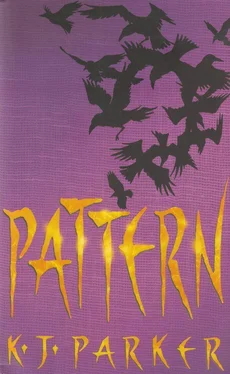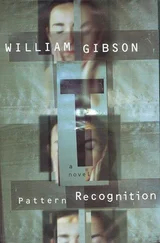K Parker - Pattern
Здесь есть возможность читать онлайн «K Parker - Pattern» весь текст электронной книги совершенно бесплатно (целиком полную версию без сокращений). В некоторых случаях можно слушать аудио, скачать через торрент в формате fb2 и присутствует краткое содержание. Жанр: Фэнтези, на английском языке. Описание произведения, (предисловие) а так же отзывы посетителей доступны на портале библиотеки ЛибКат.
- Название:Pattern
- Автор:
- Жанр:
- Год:неизвестен
- ISBN:нет данных
- Рейтинг книги:3 / 5. Голосов: 1
-
Избранное:Добавить в избранное
- Отзывы:
-
Ваша оценка:
- 60
- 1
- 2
- 3
- 4
- 5
Pattern: краткое содержание, описание и аннотация
Предлагаем к чтению аннотацию, описание, краткое содержание или предисловие (зависит от того, что написал сам автор книги «Pattern»). Если вы не нашли необходимую информацию о книге — напишите в комментариях, мы постараемся отыскать её.
Pattern — читать онлайн бесплатно полную книгу (весь текст) целиком
Ниже представлен текст книги, разбитый по страницам. Система сохранения места последней прочитанной страницы, позволяет с удобством читать онлайн бесплатно книгу «Pattern», без необходимости каждый раз заново искать на чём Вы остановились. Поставьте закладку, и сможете в любой момент перейти на страницу, на которой закончили чтение.
Интервал:
Закладка:
That amused the chaplain, for some reason. 'The truth is, Commander,' he said, 'you're far too clear-headed and straightforward to be a theologian.'
'You're too kind,' he grunted.
'Now I've offended you,' the chaplain sighed. 'I'm sorry. What I meant was, it takes a rather warped sort of mind to follow high doctrine. It's like doing arithmetic using only the odd numbers, and arbitrarily missing out any figures that begin or end with a seven. You live by logic and common sense, which is why you'll never understand theological theory.'
He coughed as the light breeze blew smoke into his face. 'Probably just as well,' he said.
'Oh, quite. You're far more use to everybody, myself and yourself included, doing what you were born to do, commanding a regiment-'
'Actually,' he interrupted, 'I don't. You've promoted me two ranks. I command a battalion, which isn't the same thing at all.'
'There,' the chaplain said cheerfully, 'that's exactly the sort of thing I have in mind. No, the point is, there's no reason at all why this bandit chieftain can't be the god Poldarn; and all the evidence suggests that that's precisely who he is. Of course,' he added, yawning, 'I'm not suggesting for one moment that he knows he's the god. In fact, it's almost certain he doesn't.'
'I see,' he said, inaccurately. 'Well, thank you for taking the time to explain. Can't say I believe any of it, but that's my loss, isn't it?'
'I suppose so. He's just as much a god if nobody believes in him; and since believing in him won't do you the slightest bit of good now that the world's coming to an end and we're all going to die, I can't see that it matters terribly much one way or another.' Almost absent-mindedly, the chaplain picked a glowing cinder off his sleeve. 'Which is why there's no earthly point in trying to save the archives; first, because they're all wrong, second, because even if they'd all been totally accurate and every prophecy and prediction had been correctly interpreted, we're all going to fry in a month or two, so, honestly, who cares? Still.' He shrugged his lean shoulders. 'My order has just lost its memory,' he said. 'From now on, for the very short time remaining to us, we don't know who we are, what we stand for, what we've said or done for the last thousand years. All that's left of us is us, and that simply isn't sufficient to justify our existence.'
He wished he hadn't got caught up in this conversation; the longer it went on, the more he could feel it oozing in over the tops of his boots. 'Well,' he said, 'if you're right about the end of the world and all that nonsense, pretty soon you won't have an existence to justify, and the problem won't arise.'
'True. And at times like this, it's a great comfort, believe me.'
The last of the girts and stays collapsed in a flurry of hot embers, filling the sky with spots of fire, like a volcano. It was obvious that the chaplain had come badly unstuck-hardly surprising, in the circumstances-and although he was talking in the most rational, lecture-to-first-years voice, all that was coming out of his mouth was half-digested drivel. On a basic infantry brigadier's pay of ninety quarters a month plus five quarters armour allowance, he wasn't paid enough to listen to elderly academics assuring him that the world was going to be burned to cold ashes before Harvest Festival.
'Anyway,' he said, 'I'll certainly bear that in mind. Still, just in case you're wrong, I suppose I'd better see about this fire.'
'Certainly,' the chaplain answered. 'You go right ahead. I think I'll stay here and enjoy the smoke.'
There was enough of it, no doubt about that. Something inside the vestry-whether it was the books or the tapestries or the wall hangings or the irreplaceable masterpieces of eighth-century religious painting-was spewing out rolling black clouds of the stuff, foul-smelling and probably very bad for your health if you breathed in too much of it. Not that there was anything he could do now, needless to say, but he very much wanted to get away from the chaplain; so he walked slowly towards the empty door frame where the bronze double gates had been.
Someone was yelling to him. He looked round and saw a young first lieutenant, whose name eluded him for the moment.
'Problem, sir,' the kid panted, wheezing like an old man. 'My platoon was on the bucket end in the south chapel when the roof came down. We were all accounted for except one. Now we've found him.'
'So?'
'It's where we found him,' the kid replied. 'He must've been in the Lady chapel when the roof fell in, and now he's got a rafter across his leg and can't shift.'
He thought for a moment: Lady chapel. Oh yes. No mouldy old books in there, but there'd been a pair of very nice gold candlesticks, a complete service of silver communion ware, and of course the offertory chest as well. All irreplaceable works of art, that went without saying, and it was very brave and heroic of the soldier to go back in there and try and save them for posterity, but now, thanks to his sheer bloody altruism, some poor suicidal fool was going to have to go in there and fish the bugger out.
Even from back here, the heat from the blaze was enough to blister someone's face. No way he could bring himself to send anyone in there; which left him with precisely one candidate for the mission. Fortunately, he'd just had it on the very best authority that the world was going to end any day now, so even if it was a suicide mission it was all as broad as it was long.
A few simple precautions, nonetheless; he confiscated a soldier's heavy overcoat and soaked it with water; did the same with two empty feed sacks and wrapped them round his face; no gloves to be found anywhere, of course, until someone suggested the bee-keeper's hut behind the guardhouse. The wet fabric felt clammy and revolting against his skin, but he couldn't think of anything better at such short notice.
He posted the young lieutenant in the doorway, with strict instructions to keep everybody else out; then a very deep breath, and inside Poldarn woke up to find that for some reason he'd tangled himself up comprehensively in the bedclothes, as if he'd deliberately twisted them round himself.
'Fire,' he shouted. 'Come on, the building's-'
He opened his eyes wide. Nothing to see. He was lying on the floor of the great hall. Everybody else had long since trooped off to work.
There'd been something utterly terrifying going on just a moment ago, but he couldn't remember what it was.
He stood up, rubbed his eyes until they could be trusted to stay open, and tottered out into the daylight. Nothing even remotely scary out there, either; all peaceful and industrious and as it should have been-apart from the carpet of black cinders lying over everything, of course.
One of the women came out of the house, carrying a basket. He stopped her.
'Rook back yet?' he asked.
She shook her head. 'Cettle's gone over there to see what's going on,' she told him. 'Mountain's playing up again.'
The way she said it made it sound like a job for the house handyman: mend the burnt skillet, the rat-house door's sticking, the yard broom needs a new handle, and when you've done that, the mountain's playing up again. 'Badly?' he asked.
'Terrible,' the woman replied. 'Been doing it half the night, puking up fire and god knows what else. That filthy ash everywhere.'
Now she was making it seem like the mountain was a naughty little boy given to vomiting on the rugs, just to get attention. 'Oh,' he said. 'Where's Halder?'
'In the cider house,' she answered, 'turning the apples.'
Poldarn nodded. 'Thank you,' he said, and crunched across the cinder-covered yard to find him. Why the hell bother turning the apples? In case they got bored, presumably.
On his way, he stopped to take a proper look at the mountain. There was that glow again, a red bruise on its cheek, and the black pillar standing out of the summit; it was ugly and unnatural, and he didn't like looking at it. And surely Rook had to be back by now?
Читать дальшеИнтервал:
Закладка:
Похожие книги на «Pattern»
Представляем Вашему вниманию похожие книги на «Pattern» списком для выбора. Мы отобрали схожую по названию и смыслу литературу в надежде предоставить читателям больше вариантов отыскать новые, интересные, ещё непрочитанные произведения.
Обсуждение, отзывы о книге «Pattern» и просто собственные мнения читателей. Оставьте ваши комментарии, напишите, что Вы думаете о произведении, его смысле или главных героях. Укажите что конкретно понравилось, а что нет, и почему Вы так считаете.












